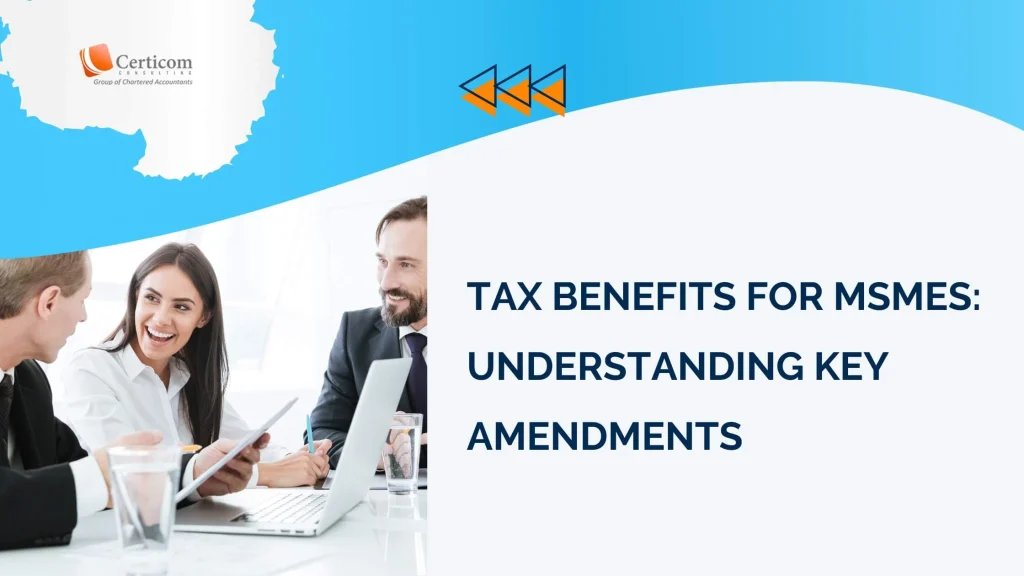Tax Benefits for MSMEs: Understanding Key Amendments

The implementation of Section 43B(h) in the Income Tax Act, 1961, from Assessment Year (AY) 2024-25, has introduced stricter payment compliance measures for businesses engaging with Micro and Small Enterprises (MSEs). This provision seeks to prevent delayed payments by disallowing expense deductions beyond specified timelines. Simultaneously, the MSMED Act, 2006, imposes interest penalties on overdue payments.
1. Section 43B(h): Payment Compliance for MSMEs
Introduced through the Finance Act, 2023, Clause (h) under Section 43B mandates that payments to MSEs must adhere to the following timelines to qualify for tax deductions:
No written agreement: Payment must be made within 15 days of receiving goods or services.
With a written agreement: Payment must be completed within 45 days.
Failure to comply results in expense disallowance for that financial year. The deduction is permitted only in the year of actual payment.

2. MSME Classification and Registration Requirements
Businesses must determine if their suppliers qualify as Micro or Small Enterprises under Udyam Registration to assess the applicability of Section 43B(h).
(A) Revised MSME Classification (Effective April 1, 2025)
| Category | Previous Investment Limit | New Investment Limit | Previous Turnover Limit | New Turnover Limit |
|---|---|---|---|---|
| Micro | Up to ₹1 crore | Up to ₹2.5 crore | Up to ₹5 crore | Up to ₹10 crore |
| Small | Up to ₹10 crore | Up to ₹25 crore | Up to ₹50 crore | Up to ₹100 crore |
| Medium | Up to ₹50 crore | Up to ₹125 crore | Up to ₹250 crore | Up to ₹500 crore |
Note: Section 43B(h) is applicable only to Micro and Small Enterprises, excluding Medium Enterprises.
(B) Registration Verification
Udyam Registration Certificate: Required to confirm MSME status.
GST Registration: Essential to differentiate traders from manufacturers and service providers. Payments to traders registered under MSME are not covered under Section 43B(h).
3. Expense Disallowance: Key Factors to Consider
A payment will be disallowed if:
The supplier is a registered Micro or Small Enterprise.
The payment is overdue beyond 15/45 days.
The expense was recorded in the Profit & Loss account in FY 2023-24 or later.
Additional Considerations:
Payments for MSME purchases that remain as closing stock will still be disallowed if delayed.
Payments made after March 31 but within the permitted timeframe will not be disallowed.
MSME benefits apply prospectively; transactions before MSME registration are not impacted.
4. Interest Liabilities for Delayed Payments
Under Section 16 of the MSMED Act, overdue payments attract interest at a rate three times the RBI-notified bank rate, compounded monthly. Even if the supplier waives the interest, the liability remains.
Tax Treatment: Interest paid or payable under Section 16 is non-deductible under the Income Tax Act (Section 23, MSMED Act).
5. Compliance & Financial Reporting Obligations
(A) Financial Statement Disclosures (As per Section 22, MSMED Act)
Businesses must include the following details in their financial statements:
Unpaid principal and accrued interest at the end of the year.
Interest paid on delayed payments during the year.
Accrued but unpaid interest.
Future interest liability, if applicable.
(B) Tax Audit Report (Form 3CD) Compliance
- Clause 22 of Form 3CD requires businesses to disclose outstanding MSME dues.
- The amount disallowed under Section 43B(h) must be reported separately.

6. MSMED Act vs. Section 43B(h): A Comparative Analysis
| Criteria | MSMED Act | Section 43B(h), Income Tax Act |
| Applicability | Micro & Small Enterprises | Micro & Small Enterprises |
| Payment Due Date | 15/45 days | Same as MSMED Act |
| Interest on Delay | 3X RBI Bank Rate (compounded monthly) | No interest under IT Act |
| Disallowance | Not applicable | Expense disallowed if delayed |
| Interest Deductibility | Not deductible (Sec 23) | Not deductible |
7. Best Practices for Businesses to Ensure Compliance
Confirm MSME status of suppliers before recording transactions.
Ensure timely payments within 15/45 days to avoid tax disallowance.
Maintain accurate records of MSME dues for financial statements and audits.
Recognize and disclose interest liabilities on overdue payments.
8. Conclusion: Adapting to the New MSME Payment Norms
Section 43B(h) is in effect from AY 2024-25, restricting tax deductions for delayed payments to MSEs.
Traders registered as MSMEs are excluded—only manufacturers and service providers are covered.
Interest on overdue payments (3X RBI rate) is mandatory and non-deductible under the MSMED Act.
Accurate disclosures in financial statements and tax audits are essential for compliance.
By adhering to these regulations, businesses can mitigate tax liabilities, avoid penalties, and maintain strong relationships with MSME suppliers while ensuring seamless financial operations.
Related Post
A Beginner’s Guide to E-Filing Income Tax Return for FY 2024-25
Faking Tax Deductions? You Could Be Penalised Up To 200% Under Income Tax Rules
Book A One To One Consultation Now For FREE
How can we help? *




